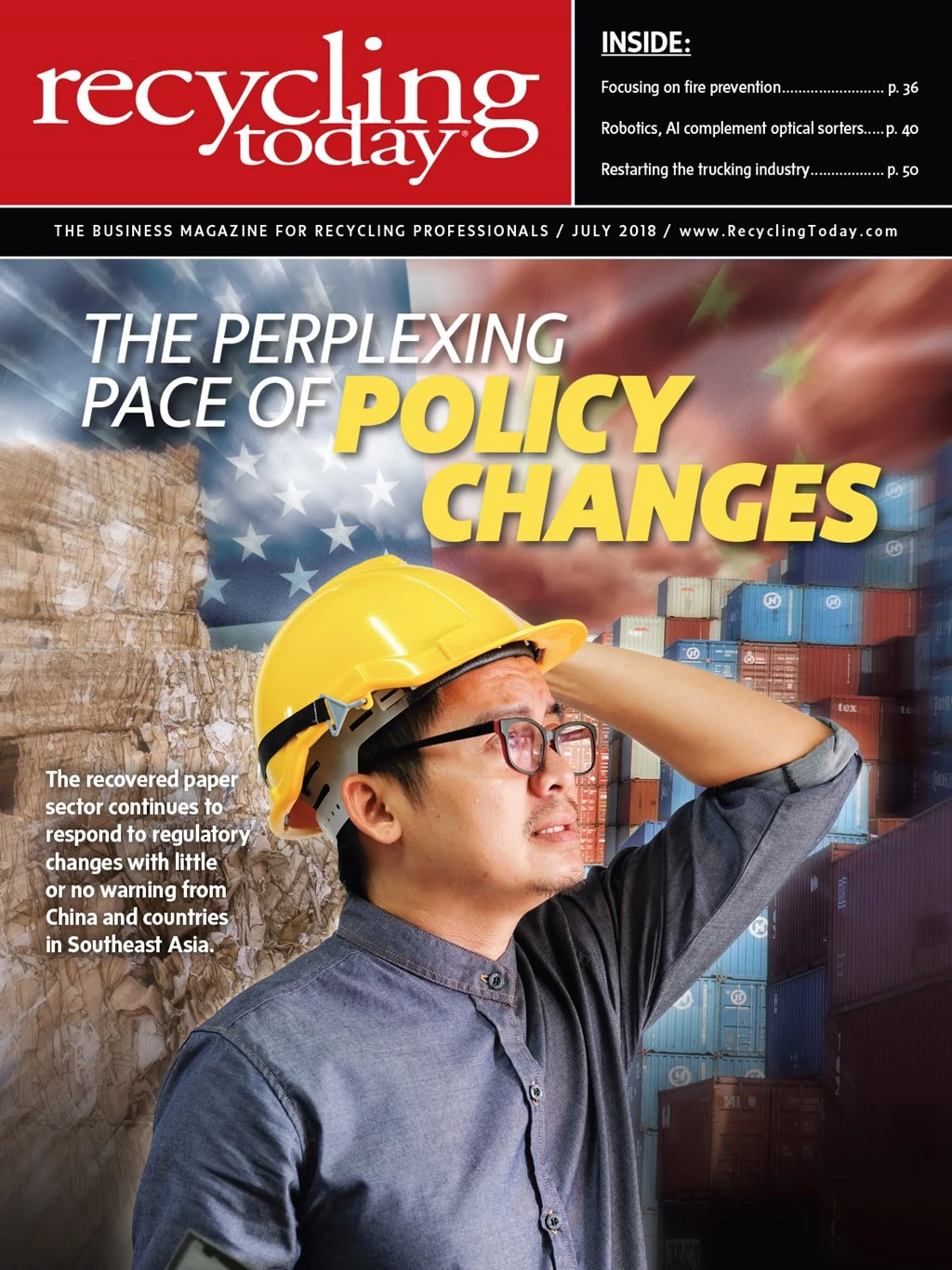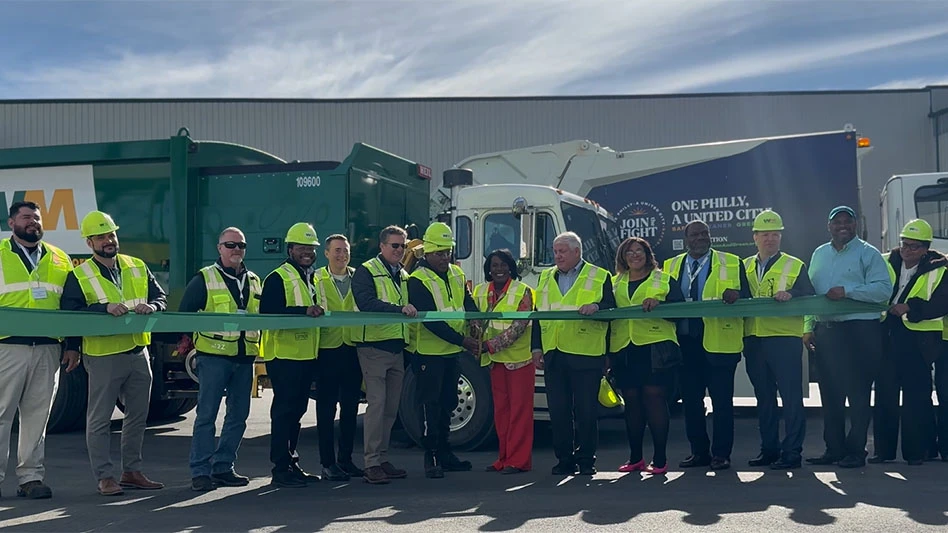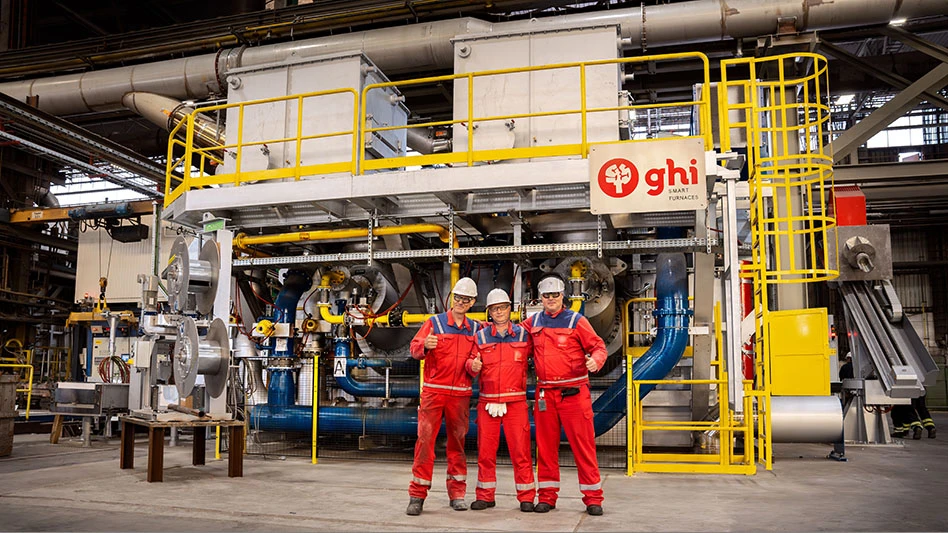
The recycling industry is in the midst of global uncertainty when it comes to trade policies and the scrap sector. Robin Wiener, president of the Institute of Scrap Recycling Industries (ISRI), Washington, said this in a mid-June message celebrating a tariff victory when the Trump administration announced June 15 that several parts used in recycling equipment had been removed from a final list of products from China that would be assessed a 25 percent import duty. ISRI said the move was in response to pressure from the association. As policy changes continue to develop at “a very fast pace,” Wiener said, “ISRI remains vigilant in advocating for recyclers.”
Supporting recyclers and ultimately trade in general is not an insular issue for the recycling industry. Public concern over the side effects of U.S. trade policy has increased, according to the International Monetary Fund (IMF), Washington, in a June 14 statement, “United States of America: Staff Concluding Statement of the 2018 Article IV Mission.”
“China has a demand for 10 tons, and they’re only getting 1 ton. The rest of the world wants 1 ton and they’re getting 10. Too many tons are being offered to everywhere that’s not China, and not enough tons are going to China because people can’t meet the specification required, and the risk if you get claimed when it goes through customs [isn’t worth it].” – An exporter based in the Pacific Northwest
In this statement, the IMF addresses moves by the Trump administration to impose new tariffs or to restrict imports into the U.S.: “These measures, though, are likely to move the globe further away from an open, fair and rules-based trade system, with adverse effects for both the U.S. economy and for trading partners.”
Trade policies beyond the U.S.—from Indonesia and Vietnam to China, of course—are profoundly affecting the recycling industry, especially secondary fiber markets. Wiener, speaking to attendees of the Paper Division meeting at the Bureau of International Recycling’s (BIR’s) 2018 World Recycling Convention & Exhibition, held in Barcelona, Spain, May 27-30, said she was “very concerned” about the spread of China’s policies and messaging to other Asian countries, specifically Indonesia and Vietnam.
At that same meeting, BIR President Ranjit Baxi said that with little or no warning, countries have introduced regulations that have “massively” affected recycling.
This includes, and is not limited to, China’s closure of the U.S. operations of China Certification and Inspection Group North America (CCIC NA), essentially freezing U.S. scrap shipments, for 30 days, effective May 4 through June 4. The U.S. operations of CCIC NA were reinstated and started accepting
Zero tolerance

Global trading of scrap paper undoubtedly has been top of mind for ISRI’s Paper Division and its Paper Stock Industries (PSI) Chapter, as is the quality of recovered fiber that is traded globally. Recent changes made by the two groups to the “Guidelines for Paper Stock” in ISRI’s Scrap Specifications Circular are intended to streamline and improve trading of scrap paper commodities, they say. These changes include integrating Domestic Transactions and Export Transactions guidelines for paper stock and clearly listing prohibitive materials that should not be included in
In that same PSI/ISRI Paper Division notice, Wiener points to investments in infrastructure as an “important step forward” in concert with public education, better efforts to design consumer products with recycling in mind and a commitment by all parties in the paper recycling industry to continue to work together.
In its June statement, the IMF also says there is “broad agreement that increasing federal spending on infrastructure is urgently needed in the United States.”
Before, or while, investments are considered and made, the recovered paper sector is attempting to get ahold of the unpredictable changes. PSI President Leonard Zeid says every time the recovered paper sector gets close to figuring out the new rules, they change again. Nobody, he says, wants to put investments in if they are unsure about the stability of the situation requiring the investment.
Zeid, who also manages paper trading at St. Louis-based Midland Davis Trading, says, “We must act fast, and
Unilateral imposition
Any moves to restrict free trade in recyclables must be resisted, Baxi, who also serves as chairman of London-based J&H Sales International, said at the BIR event in May. He bemoaned a trend toward the “unilateral imposition of regulations.”
As an example, Baxi called attention to the Indonesian government’s decision April 1, 2018, to implement a 100 percent inspection policy at the supply’s origin as a requirement for recovered paper exports to Indonesia. He said this is a problem for several reasons, referring to bottlenecks at Indonesian ports, unclear quality specifications and Indonesian mills missing out on an opportunity to import affordable fiber.
The new procedures are outlined in a notice from
ISRI said at the time of the announcement that the situation would create burdens on exporters in terms of time, cost and storage.
Additionally, the association said this measure confirms what ISRI “worried could happen—with China’s import restrictions in place and materials diverting to new customers in Southeast Asia, these governments look to be considering imposing burdensome import restrictions and requirements that will challenge the industry’s ability to recover from China’s shrinking market.”
Along with the Indonesian situation, Vietnam recently restricted imports of scrap paper and scrap plastic, albeit this move is related to port capacity. In late May, ISRI obtained a copy of a letter that the Tang Cang-Cai Mep International Terminal of Vung Tau province, Vietnam, sent to shipping companies announcing restrictions on these scrap materials from all supplier countries.
ISRI’s message reads, “This notice comports with rumors that Vietnamese customers had no more room for imported materials and that the buildup of containers of recovered paper and plastic scrap diverted from China were causing delays at Vietnam’s main import terminal. The restrictions include:
- “starting June 15, all recovered paper and plastic scrap cargoes are required to have valid import permits and a letter indicating the date the container would be picked up by the domestic customer. If those documents are not included, then the containers must be diverted elsewhere;
- “from June 25 through Oct. 15, the port authority will stop accepting containers of plastic scrap;
- “from June 25 through Oct. 15, the port authority will continue to clear containers of recovered paper as long as they comply with the requirements in the first bullet point; and
- “Oct. 15, the port authority will review the situation and issue further guidance as needed.”
The association adds that it is “confident this is more to do with port capacity constraints and not a permanent regulatory shift.”
For some time, sources have been citing Indonesia and Vietnam as alternate markets for their shipments of secondary fiber as China closed its long-open doors to mixed paper and some old corrugated containers (OCC) loads earlier this year.
Recyclers in the U.S. have been piling up thousands upon thousands of bales of mixed paper when possible and even landfilling and incinerating this material when they have been unable to find markets.
Beyond Indonesia, others have found alternative outlets, selling recovered fiber typically destined for China to India, Korea, Malaysia, Taiwan
An exporter of secondary fiber based in the Pacific Northwest says, “China has a demand for 10 tons, and they’re only getting 1 ton. The rest of the world wants 1 ton and they’re getting 10. Too many tons are being offered to everywhere that’s not China, and not enough tons are going to China because people can’t meet the specification required, and the risk if you get claimed when it goes through customs [isn’t worth it].”
He adds, “If you have a rejection at customs, you can have one bad bale; but, if you have 20 containers, all 20 come back, not just the one [bale].”
Ripple effects

In China, prices of OCC and other recovered fiber grades have skyrocketed, causing ripple effects in its paper industry, Baxi told attendees of the BIR convention. With OCC pricing ranging from $440 to $480 per ton in China, “Chinese mills buy at these high prices,” and in turn finished containerboard prices in China are now hitting $700 to $800 per ton, he said.
In the U.S., OCC No. 11 averaged from $70 to $80 per ton FOB (freight on board) the seller’s dock, according to Boston-based research firm RISI—the lowest price in nearly six years.
Mixed paper, which sold for $59.17 per ton in May 2017, sold for a negative figure in May 2018 at minus $1.94 per ton.
The source in the Pacific Northwest says he has a supplier in the region that paid $31 per ton to export mixed paper.
With prices so varied, he says, mills are considering changing their raw material mixes. “As cheap as corrugated is becoming again, mills still can’t ignore: ‘Do I want to pay $100 for corrugated in the south or do I want to use 5 percent mixed at $0?’
“You can get mixed paper for free or charge to take it,” he adds. “That’s too attractive to ignore.”
The future attractiveness of secondary fiber markets remains up in the air as rules keep changing. Here’s to getting through the ugliness of it all.

Explore the July 2018 RT Issue
Check out more from this issue and find your next story to read.
Latest from Recycling Today
- ReElement, Posco partner to develop rare earth, magnet supply chain
- Comau to take part in EU’s Reinforce project
- Sustainable packaging: How do we get there?
- ReMA accepts Lifetime Achievement nominations
- ExxonMobil will add to chemical recycling capacity
- ESAB unveils new cutting torch models
- Celsa UK assets sold to Czech investment fund
- EPA releases ‘National Strategy to Prevent Plastic Pollution’





